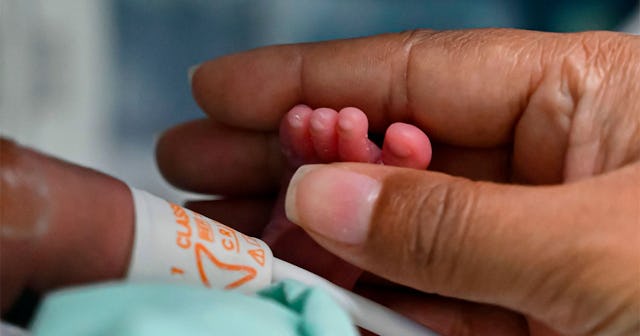Newborns Are Getting COVID-19, Too

On Sunday, October 4th, ‘American Idol’ Alum Casey ‘Quigley’ Goode announced on her Instagram that her two-week old newborn son had tested positive for COVID-19.
Goode’s son, who’d spent eight days in the NICU after birth, had been running a fever and Goode and her husband, Jack Poticorn, took the newborn to the emergency room. The newborn had reportedly been exposed through direct contact with an infected medical professional who cared for him earlier that same week.
Unfortunately, Goode’s story is not an isolated incident.
In one county in Texas, 85 babies under the age of one tested positive for COVID-19 since March. Of those, one six-week old baby tragically died.
In August, in Los Angeles County, eight babies who were tested at birth were determined to be COVID-19 positive.
Early in the pandemic, the initial information we received suggested that children did not get sick from COVID-19, or if they did, they weren’t as sick as adults. They were spared, or possibly even immune. We’ve since learned that’s not always true. Children can become severely ill from, and transmit, COVID-19. Even newborn babies. And newborns (or really all children under the age of two) are more likely to require hospital care while ill, according to Johns Hopkins.
Symptoms of Coronavirus In Babies
A newborn baby in the maternity ward at Frimley Park Hospital in Surrey on May 22, 2020 in Frimley, United Kingdom.
Steve Parsons/Getty
According to the Mayo Clinic, in most cases, the symptoms of COVID-19 in babies may include:
- Fever
- Nasal congestion or runny nose
- Cough
- Sore throat
- Shortness of breath or difficulty breathing
- Fatigue
- Headache
- Muscle aches
- Nausea or vomiting
- Diarrhea
- Poor feeding or poor appetite
- New loss of taste or smell
- Belly pain
- Pink eye (conjunctivitis)
While most cases are mild, a June study from the Journal of the American Academy of Pediatrics that looked at the epidemiological characteristics and transmission patterns of pediatric patients with COVID-19 in China showed that 10% of infants who tested positive became very ill.
Why Are Infants More Vulnerable to COVID-19?
South_agency/Getty
Researchers don’t yet know why infants are becoming more ill than older children, but a few theories abound. In an interview with ABC News, Dr. Todd Ellerin, an infectious disease specialist at South Shore Health in Massachusetts, suggested that infants may be getting sicker because they have immature immune systems. Another theory speculates that infants are getting sicker than older children because of their tiny airways.
When it comes to MIS-C, the multisystem inflammatory syndrome in children, doctors don’t yet know whether newborns are affected by the syndrome or not. Experts have urged caution. In an interview with Scientific American, Leena B. Mithal, a pediatric infectious disease specialist at Northwestern University, noted that the syndrome has mostly affected children older than one, but that it’s too early to tell whether babies younger than one can develop it.
How Are They Getting Sick?
Newborns aren’t going out to restaurants. They aren’t running in and out of grocery stores with people who refuse to wear masks for one inane reason or another. They aren’t conducting a cost-benefit analysis in order to determine what amount of risk they are willing to take in order to make ends meet.
Newborns are getting infected due to the decisions of others — whether made recklessly or out of necessity. In the case of Casey ‘Quigley’ Goode, her newborn was infected by a caregiver. In other cases, newborns are getting infected by visitors, friends or family members who have come to meet the new baby. And some newborns are being infected in the womb, because the mother has contracted the virus.
The truth is that though severe infection in newborns is rare, it is definitely not impossible. The risk isn’t zero. Not only that, we don’t yet know the long-term implications of this virus — not on adults, and certainly not on newborns. And that unknown matters. USA Today reported a case of a baby who was infected while in the womb; upon an examination, doctors observed inflammation in the newborn’s brain. It’s important to share that story, not to scare pregnant women or new mothers, but because early on, we all didn’t necessarily receive the correct information—largely because we didn’t have correct information.
Sharing these stories and this information now, rather than functioning as a scare tactic, allows families to make informed choices about throwing baby showers or sprinkles and deciding how many, if any, visitors they will allow into their homes.
And always, if you choose to have visitors for your newborn, try to stay outside and make sure everyone washes their hands and wears a mask. Or don’t forget: there’s always Zoom. Our babies are always vulnerable, but during a pandemic, their vulnerability is at a whole new — and unprecedented — level.
This article was originally published on